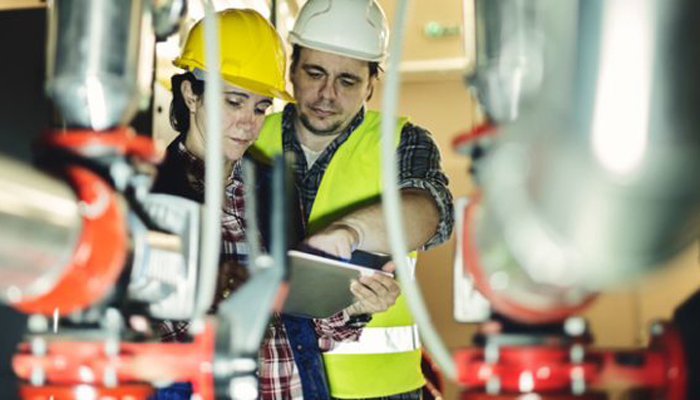Women in Taylor Woodrow: Changing the Equation

Getting the right gender balance in the construction industry is something that will benefit us all, so why not work together to try to solve the problem – that was the premise behind the ‘Changing the Equation’ event hosted by the Women in Taylor Woodrow.
For us retain our female talent there are factors that we need to stamp out such as unconscious bias and bad behaviour, whilst at the same time providing role models to reinforce the message that senior roles are an attainable target. We must show that we value difference and acknowledge flexible working as the norm to ensure that we support everyone in achieving a work-life balance that is right for them. It’s all about creating the right environment in which everyone can thrive.
‘Changing the Equation’ was a collaborative panel event which brought together attendees from fellow contractors, clients and supply chain to discuss breaking down the barriers holding back women in construction: what’s stopping us retaining female talent so that they progress into more senior roles and more importantly, how can industry work to overcome those barriers.
Panel members were –
- Vivienne Morris, Transport for London - Senior HR Business Partner supporting the Major Projects Directorate, Engineering Directorate and HSE Directorate
- Dean Greave, Women in Science and Engineering (WISE) - Membership Manager
- Alison Norrish, Arup - Director
- Victoria Hughes, VINCI Facilities - Business Responsibility Director
- Lizzie Featherstone, Taylor Woodrow - Head of Business Information Tools and Chair of Women in Taylor Woodrow
Over 100 people attended, with a 60:40 gender split, forming a great atmosphere for a lively debate.
The evening started with each of the panel members giving their own insights into the problems and talking about the ways in which their organisations are trying to overcome them. Then the audience joined the discussion and some clear themes emerged:
Role Modelling
The presence of a role model is a powerful thing. Women already in senior roles can help others by promoting and supporting them, and their presence alone demonstrates that gender doesn’t have to be a barrier. Lizzie talked about a simple step that Taylor Woodrow’ have taken in their internal newsletter, where a senior woman is interviewed by a group of graduates for each edition to offer a good opportunity for the graduates and to consistently promote role models throughout the business.
Calling out bad behaviour
Everyone deserves to feel comfortable and treated as an equal in their working environment. Although progress has been made since the spotlight has been shone on equality and diversity, we still have a way to go. Alison shared a method she has used to highlight things that just aren’t right by stopping each time she witnessed an inappropriate comment and simply recording it at the back of her notebook. Through taking that moment to stop and acknowledge the behaviour, people got to learn that what they had just said was unacceptable and began to self-police and stop.
Combatting unconscious bias
Victoria talked about our unconscious bias and how it takes real effort in terms of an organisation’s recruitment processes to ensure that this isn’t a limiting factor for applicants either seeking a way into the business or putting themselves forward for promotion. Robust interview processes/questions and blind selection are just some of the methods that organisations can adopt to start to take unconscious bias out of the equation.
Making flexible working a reality for all
This features as part of the WISE 10 Steps campaign which Dean described and is a big factor in preventing the loss of skilled employees’ mid-career. To be truly effective, organisations need to view flexible working as a positive option that increases the candidate-pool for any role. Showing that people at very senior levels work flexibly and are comfortable with it helps make this the norm throughout organisations, and small steps such as changing meeting times so that everyone can attend can make a big difference.
Valuing difference
Fostering an environment where everyone’s differences are celebrated and valued makes an inclusive culture for all. Vivienne described TfL’s core value statement as ‘we value difference’ and by taking this approach, organisations can develop strong teams where everyone feels empowered and thrives.
With females making up 46% of the UK workforce and only 12% of the construction industry, the change that needs to happen isn’t going to occur overnight. However, collaboration sparks innovation and imaginative thinking.
Kelly Tanner, Communications Manager for Taylor Woodrow and part of the Women in Taylor Woodrow group said: “Retaining our talent is only part of the puzzle but it should in theory be the easiest one to solve.
We’re talking about people who are already here – their passion for the industry has been sparked, they’ve learnt, they’ve grown and with everyone’s commitment to building the right environment, they will stay and thrive. Through events like this we can encourage more of the incremental changes needed to achieve the balance that will benefit us all.”
Add your comment

- Administration 1
- Building Design, Planning, Development 1
- Catering 3
- Construction 5
- Contracts, Projects, Bids 3
- Energy Management 1
- Engineering, Maintenance 14
- Estates, Property 4
- Facilities Management (main) 22
- Hard Services 12
- Health & Safety 1
- Management 6
- M&E 4
- Operations 10
- Sales & Marketing 3
- Soft Services 6
- Sustainability 2
- ICT, Technical 1
- Workplace 2


